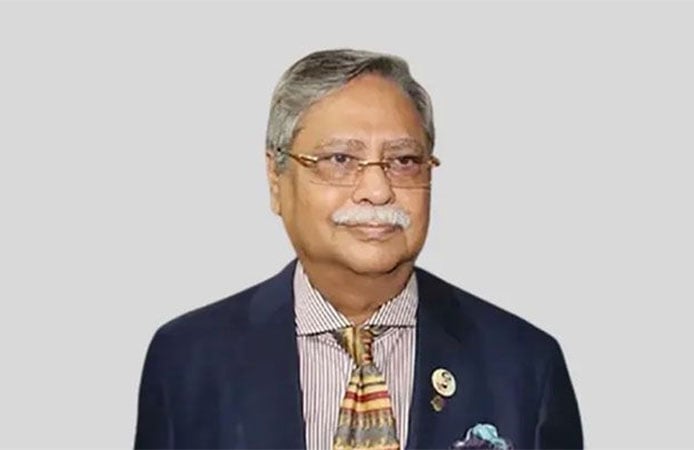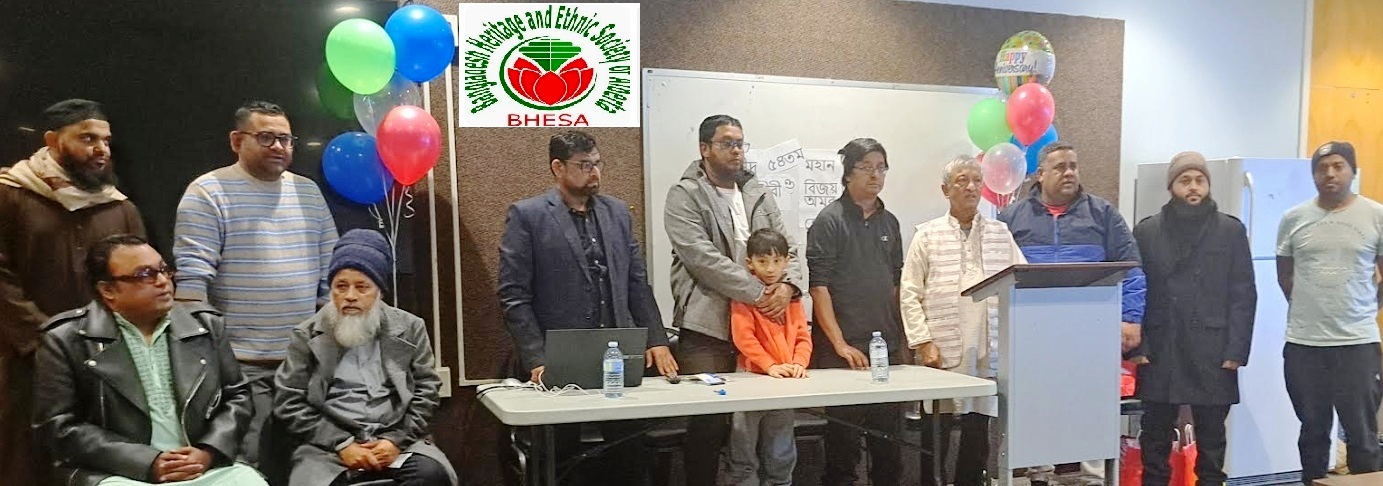Requirements not met
Your browser does not meet the minimum requirements of this website. Though you can continue browsing, some features may not be available to you.
Browser unsupported
Please note that our site has been optimized for a modern browser environment. You are using »an unsupported or outdated software«. We recommend that you perform a free upgrade to any of the following alternatives:
Using a browser that does not meet the minimum requirements for this site will likely cause portions of the site not to function properly.
Your browser either has JavaScript turned off or does not support JavaScript.
If you are unsure how to enable JavaScript in your browser, please visit wikiHow's »How to Turn on Javascript in Internet Browsers«.
International News
President pays tributes to Liberation War heroes on Victory Day
- Details

SAVAR, Dec 16, 2025 (BSS) - President Mohammed Shahabuddin today paid rich tributes to the martyrs of the 1971 Liberation War by placing a wreath at the National Memorial here, on the outskirts of the capital, marking the 55th Victory Day.
The Head of the State laid the wreath at the altar of the National Memorial with the rise of the sun at 6.34am.
A contingent drawn from the Armed Forces Division (AFD) -Bangladesh Army, Navy and Air Force- presented the state salute on the occasion.
Earlier, the Victory Day's programme began with a 31-gun salute in Dhaka early morning.
After placing the wreath, the President stood in solemn silence for a while as a mark of profound respect to the memories of the martyrs of the country's War of Liberation in 1971.
During that time, the bugle played the last Post. President Shahabuddin also signed the visitors' book kept there.
Earlier, on his arrival, the President, also the supreme commander of the Armed Forces Division (AFD), was welcomed by the chiefs of the three services.
Injured valiant freedom fighters and their family members, advisers to the interim government, foreign diplomats, invited guests, and high-ranking civil and military officials were present there.
After paying tributes to the war heroes, the President, also a valiant freedom fighter, exchanged greetings with the injured freedom fighters and their family members.
Fifty-four years back on December 16 in 1971, Bangladesh was born as an independent country in exchange for the supreme sacrifice of three million martyrs and two lakh women.
It is celebrated on December 16 every year to commemorate the victory of Bangladesh against the Pakistani occupation forces.
Along with the government, different socio-political, educational and cultural institutions and organisations have chalked out a series of programmes to celebrate the day.
Shaheed Intellectuals Day and 55th Victory Day Observed in Alberta, Canada
- Details

Edmonton, Alberta | December 16, 2025 (BHESA): Shaheed Intellectuals Day (December 14) and the 55th Great Victory Day of Bangladesh were observed with due solemnity at the ACT Aquatic & Recreation Centre in Roundel Park, Edmonton.
The program paid tribute to the martyred teachers, students, journalists, intellectuals, and public servants who laid down their lives during the Liberation War of 1971. It also commemorated December 16, 1971—the day the Bengali nation achieved its ultimate victory after nine months of a bloody armed struggle, culminating in the surrender of the occupying Pakistani forces and the birth of an independent and sovereign Bangladesh founded on four core principles: democracy, socialism, secularism, and nationalism.
Recalling the political continuum of the Liberation War—from the Language Movement of 1952 to the Six-Point Movement of 1966, the Eleven-Point Movement of 1969, and the historic election of 1970—the chief guest, Bir Muktijoddha Delwar Jahid, founding executive member of Bangladesh Muktijoddha Sangsad Canada Unit and President of the North American Journalists Network, highlighted the sacrifices of the leaders of the Provisional Government, sector commanders, freedom fighters, and the persecuted mothers and sisters of the nation.
The event was presided over by Saifur Hasan, President of the Bangladesh Heritage and Ethnic Society of Alberta (BESA). Among those present were Engineer Kabir Hossain, journalist Md. Ismail, Haidar Jan Chowdhury, automotive technician, Tanvir Hasan, Shakil Ahmed, Ryhana Rasmin, women representatives, Sonia Akter, Selina Islam, Ayesha Parvin, Shiuli Begum, Rima Begum, Sabira Hasan, Osheneya, and others.
In his address, the chief guest stated that while the sacrifices of the martyrs constitute a glorious chapter in the nation’s history, they have been politicized and remain contested. He warned that attempts are being made to undermine the dignity of martyrs’ families before the new generation by distorting the history of atrocities committed by the Pakistani occupation forces and their collaborators—Razakars, Al-Badr, and Al-Shams—and that those backing such efforts are now calling for civil conflict within the country.
Mr. Jahid urged families and educational institutions to actively cultivate patriotism, historical consciousness, and a sense of responsibility toward the true history of the Liberation War among children and adolescents.
On behalf of BESA, new immigrants were formally welcomed to Edmonton, with a call for unity and organization within the community. An open discussion followed, with participation from artist Tamim Hossain, Montasir Mamun, and Md. Jamal Uddin, Md. Rais Uddin, Sultan Russell, and Saifur Hasan.
During the meeting, a five-member executive committee was formed to reorganize and strengthen the Bangladesh Heritage and Ethnic Society of Alberta:
President: Sultan Russell; Vice President: Md. Jamal Uddin; Secretary: Md. Rahis Uddin; Treasurer: Montasir Mamun; Ex-Officio: S. Hasan.
The chief guest introduced the newly elected officers. Mr. Jahid, along with Saifur Hasan and Sultan Russell, distributed Victory Day gifts among children and adolescents.
The event concluded with the serving of traditional Bangladeshi cuisine, which all attendees warmly appreciated.
Vaisakhi Celebrated with Spirit and Tradition at Alberta Legislature
- Details

Edmonton, April 15, 2025 — The halls of Alberta’s Legislature Building were filled with vibrant color, music, and spirit today as Honourable Nathan Cooper, Speaker of the Legislative Assembly, hosted a special Vaisakhi celebration at the historic Rotunda at 11:45 a.m. The event drew community leaders, cultural groups, and elected officials together to recognize this significant festival for the Sikh community and other South Asian cultures.
In a gesture of unity and celebration, Speaker Cooper opened the Legislative session later that afternoon by acknowledging the Vaisakhi ceremony and recognizing guests who participated earlier in the day. Addressing the Assembly, he said, “Happy Vaisakhi to everyone,” before inviting distinguished guests in the gallery to rise and be acknowledged with the Assembly’s warm welcome.
Among the honored guests were Dr. Amit Kumar, Lipika Choudhury, Puneet Manchanda, Ilona Maitra, Rajeev Mittal, Harjeet Singh, and Delwar Jahid, Bangladesh origin an eminent journalist reflecting the diversity and community involvement that the event embodied.
A highlight of the celebration was the performance by the Gurukul Dance Studio of Calgary, whose members led the singing of the anthem at the Rotunda event. Their graceful presentation set the tone for a morning steeped in heritage and harmony.
During the session, MLA Mr. Singh (Calgary-East) proudly introduced members of the Sarb Akal Society of Calgary, a group deeply rooted in cultural preservation and community service, led by Mr. Harjeet Singh. Their presence at the Legislature underscored the importance of acknowledging and uplifting cultural identities within public service and civic pride.
Members from various constituencies also took part in the day’s celebration, introducing school groups and community organizations, all of whom received heartfelt welcomes from the Assembly. MLA Ms. Lovely (Camrose) shared her admiration for the young performers from Gurukul, while MLA Mr. Stephan highlighted the contributions of the YYC Society, and MLA Ms. de Jonge welcomed community leaders and families from Chestermere who attended the Vaisakhi ceremony.
The formal session began with the Speaker’s opening prayer, invoking guidance and wisdom for all in positions of leadership — a sentiment echoing the values of service and humility celebrated during Vaisakhi.
As the Legislative Assembly continued with its regular proceedings, the spirit of the morning’s celebration lingered — a testament to Alberta’s commitment to cultural inclusion and recognition of its richly diverse population.
Vaisakhi, which marks the Sikh New Year and the founding of the Khalsa in 1699, is a time of joy, reflection, and community service. Today’s event at the Alberta Legislature served not only as a celebration of that legacy but also as a reminder of the strength found in multiculturalism and shared values.
Rethinking Political Change and Civil Unrest: Bangladesh on the Brink of Civil War
- Details

On August 5, the political landscape in Bangladesh changed dramatically, with Prime Minister Sheikh Hasina reportedly leaving the country with military support. Following her departure, a constitutionally illegitimate Advisory Council led by Dr. Muhammad Yunus and backed by the military took control. A cabinet composed of student advisors was formed, marking a significant departure from the traditional governance structure.
At the same time, the country witnessed an unprecedented wave of judicial action, with the International Criminal Tribunal for the former Yugoslavia (ICTY) beginning to handle hundreds of cases, including allegations related to the deaths of more than 800 students and civilians who had been actively involved in the movement before the regime change. Dr. Yunus acknowledged that the movement leading to this change was meticulously planned. However, subsequent events have been marked by widespread reports of police brutality, persecution of minorities, sexual violence, arson, extrajudicial killings, and mass arrests of political figures and activists linked to the previous administration.
The new government faces significant challenges, including an economic downturn, diplomatic failures, and increasing reliance on fundamentalist groups and Pakistan. The rising tensions have also strained Bangladesh's historically strong alliance with India, which could lead to broader geopolitical consequences, including military conflict.
Civil Wars in Historical Context: Civil wars have shaped the political, social, and economic landscapes of nations throughout history. While internal conflicts are usually internal, they often attract international attention due to their far-reaching effects. This section examines the causes, consequences, and political dimensions of civil wars, including historical and contemporary examples.
Historical Summary of Civil Wars: From ancient times to the modern era, civil wars have played a significant role in changing national trajectories. The Peloponnesian War (431–404 BC) saw the Greek city-states engaged in a struggle that bore the characteristics of a civil war. Similarly, the Roman Civil War (49–45 BC) led to the fall of the republic and the rise of imperial rule.
In the following centuries, internal conflicts such as the Wars of the Roses in England (1455–1487), the English Civil War (1642–1651), and the American Civil War (1861–1865) reshaped governance structures. The 20th and 21st centuries saw the Russian Civil War (1917–1922), the Spanish Civil War (1936–1939), and the Chinese Civil War (1927–1949), all of which had lasting global effects. Recent conflicts, including Syria (2011–present) and Yemen (2014–present), illustrate the ongoing nature of civil wars.
Causes of civil wars
Civil wars arise from a variety of political, economic, and social factors, including:
Political oppression: Authoritarian rule and suppression of dissent often lead to civil wars, as seen in Syria and Libya.
Ethnic and religious divisions: The conflicts in Rwanda (1990–1994) and Nigeria (1967–1970) show how deep divisions can trigger violent struggle.
Economic inequality: Disputes over resources, as in Sudan, can lead to civil wars.
Colonial legacies: Arbitrary borders drawn by colonial powers have led to long-standing internal conflicts in Africa and the Middle East.
Ideological clashes: Political ideologies such as communism versus capitalism have historically fueled wars such as Vietnam and Greece.
Consequences of civil wars: The effects of civil wars are profound, including:
Humanitarian crises: Mass displacement, famine, and widespread human rights violations.
Economic collapse: Destruction of infrastructure and depletion of human capital.
Political instability: Iraq and Afghanistan have experienced challenges to post-conflict governance. Bangladesh seems to be following the same path of conflict.
Regional and global impacts: Destabilization of the entire region, resulting in refugee crises and international intervention.
Political perspectives on civil wars
Different schools of thought offer unique interpretations of civil wars:
Realist perspective: Sees civil wars as power struggles, prioritizing state sovereignty and non-intervention.
Liberal perspective: Advocates human rights and international peacekeeping.
Marxist perspective: Relates civil war to class struggle and economic inequality.
Constructivist perspective: Examines identity, culture, and social structure in civil war.
Comparative Bangladesh scenario
Bangladesh's political unrest, while not yet a full-blown civil war, exhibits many of the characteristics found in internal conflicts worldwide. Political repression, suppression of dissent, judicial manipulation, economic instability, and shifting international alliances have intensified tensions. The government is busy erasing all the history of the country from the 1971 liberation war to the subsequent coups and politics. The defeated forces of 1971 are on the field to take revenge. The Bangabandhu Memorial Museum was bulldozed with the help of the government. They are busy creating a communal state by erasing all the history, traditions, and achievements of independence in the name of reforms, which will give rise to a massive conflict shortly.
- Additional Resources:
- Additional Resources:
- Agro-Ocean
- Bangabandhu Development and Research Institute
- Bangladesh North American Journalists Network
- Bangladesh Heritage and Ethnic Society of Alberta (BHESA)
- Coastal 19
- Delwar Jahid's Biography
- Diverse Edmonton
- Doinik Ekattorer Chetona
- Dr. Anwar Zahid
- Edmonton Oaths
- Mahinur Jahid Memorial Foundation (MJMF)
- Motherlanguage Day in Canada
- Samajkantha News
- Step to Humanity Bangladesh

















